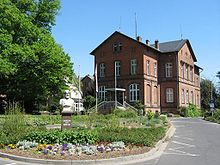Geisenheim Grape Breeding Institute
Appearance

The Geisenheim Grape Breeding Institute was founded in 1872 and is located in the town of Geisenheim, in Germany's Rheingau region. In 1876 Swiss-born professor Hermann Müller joined the institute, where he developed his namesake grape variety Müller-Thurgau, which became Germany's most-planted grape variety in the 1970s. Professor Helmut Becker worked at the institute from 1964 until his death in 1989.[1]
Academic Grade
Geisenheim is the only German institution to award higher academic degrees in winemaking. Formally, undergraduate level viticulture and enology, ending with a bachelor's degree in engineering is awarded by the University of Applied Sciences in Wiesbaden, and the newly introduced master's degree is awarded by the Giessen University.
Breeds
- White: Müller-Thurgau, Arnsburger, Ehrenfelser, Saphira, Reichensteiner, Ehrenbreitsteiner, Prinzipal, Osteiner, Witberger, Schönburger, Primera, Rabaner, Hibernal
- Red: Rotberger, Dakapo
- Improvements: Rondo, Orléans, Dunkelfelder,
See also
References
- ^ Robinson, Jancis (Ed.) The Oxford Companion to Wine. Oxford: Oxford University Press, second edition, 1999.
